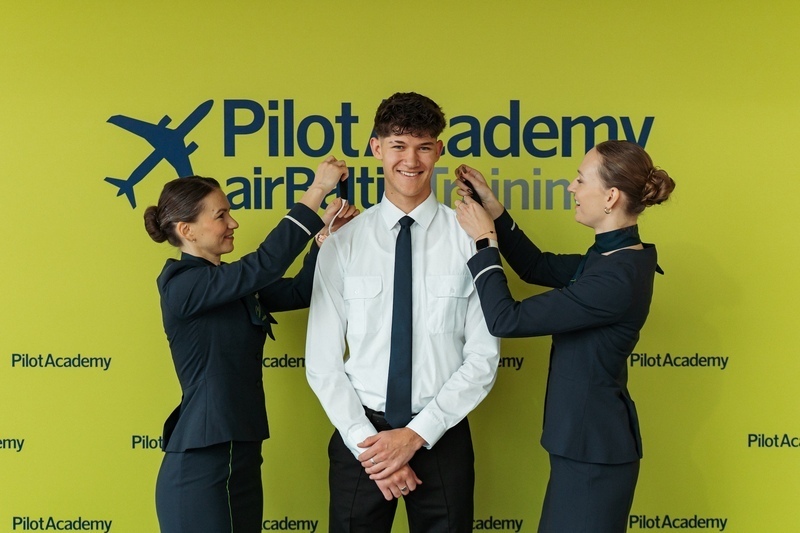Published on
November 6, 2025
AirBaltic’s 28th cohort of aspiring pilots has officially commenced their training, with 17 new students from Latvia, Lithuania, Estonia, France, and Germany. These talented individuals are set to embark on a journey to earn their commercial pilot licenses, marking a significant step in their aviation careers. This new cohort highlights the airline’s continued commitment to developing skilled pilots for its growing fleet, reinforcing its role in fostering the next generation of aviation professionals.
The 28th cohort of 17 students has officially commenced their professional pilot training at the airBaltic Pilot Academy, part of the Latvian national carrier, airBaltic. This new group consists of students from Latvia, Lithuania, Estonia, France, and Germany, with the goal of earning a commercial pilot’s license upon completion of the full-time airline transport pilot program.
Robbert Strating, SVP Flight Operations at airBaltic: “It is always a proud moment to welcome a new group of cadets to the airBaltic Pilot Academy. Their journey represents not only personal ambition but also the continued growth of airBaltic and our commitment to developing highly qualified aviation professionals in the region. The success of our graduates – now serving as First Officers and even Captains – clearly demonstrates the strength of our training program and the opportunities it provides for a long-term career within the airline.”
The airBaltic Pilot Academy currently hosts 158 active students from the Baltics and across Europe, with over 10% of them being women. Since its inception, 163 graduates have joined the airline, with the majority serving as First Officers and several now working as flight training instructors. A significant achievement for the academy is that four of its alumni have successfully upgraded to Captain, marking them as the first graduates to reach this prestigious position at airBaltic. This accomplishment highlights the strength of the academy’s training program and the clear career trajectory from cadet to Captain.
Aspiring pilots at the airBaltic Pilot Academy are required to finance their ATPL theory studies and 45 flight hours, amounting to EUR 25,000. Once they pass the airline’s pilot assessment and secure a position with airBaltic, the company offers financial support through a loan to cover the remaining training costs.
For more than a year, airBaltic has been enhancing its training capabilities with the addition of a second Airbus A220 full flight simulator. This advanced technology has significantly boosted the airline’s ability to train and certify its expanding pilot team, playing a key role in both fleet expansion and the continuous development of its Pilot Academy. The simulator offers aspiring pilots the chance to train with cutting-edge industry technology, giving them a head start in their careers.
Over the last three decades, airBaltic has established itself as a respected international carrier. It now serves 80 destinations across Europe, the Middle East, North Africa, and the Caucasus, playing a crucial role in connecting the Baltic States to global markets.
For over a year, airBaltic has made significant strides in enhancing its training capabilities with the installation of a second Airbus A220 full-flight simulator. This state-of-the-art addition enables the airline to expand its training capacity, providing its growing team of pilots with the tools they need to succeed. The new simulator is a pivotal asset for both training and certification, ensuring airBaltic’s pilots are well-prepared for the challenges of modern aviation. This upgrade further supports the airline’s expanding fleet, ensuring its pilots are trained on the latest technologies available in the industry.
As airBaltic continues to grow, the addition of the new simulator also plays an integral role in the ongoing development of its Pilot Academy. The academy serves as a critical platform for training the next generation of pilots, equipping them with the skills needed to meet the high standards of the airline. With the airline’s expanding network and increasing fleet, the academy is crucial in fostering a skilled, well-prepared workforce to meet the growing demands of the aviation sector.
This advanced technology is not just an upgrade in equipment, but a step forward in the airline’s commitment to providing world-class training. The Airbus A220 full flight simulator offers aspiring pilots a realistic, immersive experience, simulating various in-flight scenarios. This ensures that pilots can undergo comprehensive training without leaving the ground, minimizing risks while maximizing training efficiency. With this cutting-edge tool, airBaltic is setting a new benchmark for pilot training in the region.
AirBaltic’s commitment to enhancing its training facilities reflects the airline’s broader strategy of growth and innovation. Over the past three decades, the airline has transformed from a regional carrier into a highly respected global player. Serving 80 destinations across Europe, the Middle East, North Africa, and the Caucasus, airBaltic plays a vital role in connecting the Baltic region to the rest of the world. Its expansive network makes it a key player in providing essential infrastructure for the region’s travel and tourism sectors.
AirBaltic has welcomed its 28th cohort, consisting of 17 aspiring pilots from Latvia, Lithuania, Estonia, France, and Germany. The group will undergo rigorous training to earn their commercial pilot licenses. This milestone reflects the airline’s dedication to nurturing talent and supporting the growth of its fleet with skilled professionals.
As airBaltic continues to expand its fleet and flight network, the airline remains focused on maintaining the highest standards of safety, efficiency, and service. With its state-of-the-art flight simulators and a commitment to training excellence, airBaltic ensures that its pilots are well-equipped to operate in an increasingly complex aviation landscape. The airline’s continued growth is a testament to its dedication to delivering exceptional service while supporting the development of the aviation industry at large.
